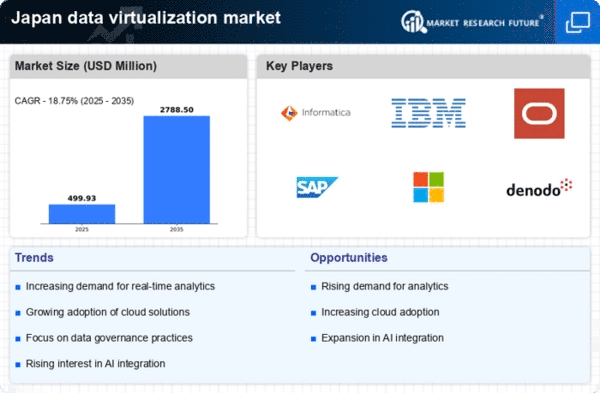Growing Emphasis on Data Analytics
In Japan, the growing emphasis on data analytics is significantly influencing the data virtualization market. Organizations are increasingly recognizing the value of data-driven decision-making, leading to a heightened demand for tools that can provide comprehensive insights. The data analytics market in Japan is expected to grow at a CAGR of around 15% over the next few years. This reflects a strong appetite for advanced analytics capabilities. Data virtualization solutions play a crucial role in this landscape by enabling organizations to access and analyze data from disparate sources without the need for extensive data replication. This trend is likely to enhance the overall efficiency and effectiveness of data utilization in various sectors.
Rising Adoption of Cloud Solutions
The data virtualization market in Japan is experiencing a surge due to the increasing adoption of cloud solutions. Organizations are increasingly migrating their data to cloud platforms, which facilitates seamless access and integration of data across various sources. This trend is driven by the need for agility and scalability in business operations. According to recent estimates, the cloud computing market in Japan is projected to reach approximately $20 billion by 2025, indicating a robust growth trajectory. As businesses leverage cloud technologies, the demand for data virtualization solutions that enable efficient data management and real-time analytics is likely to rise, thereby propelling the data virtualization market forward.
Need for Enhanced Operational Efficiency
The data virtualization market in Japan is propelled by the need for enhanced operational efficiency among organizations. As businesses strive to optimize their processes and reduce costs, the ability to access and integrate data from multiple sources in real-time becomes increasingly critical. Data virtualization solutions offer a streamlined approach to data management, allowing organizations to eliminate data silos and improve collaboration across departments. This shift towards operational efficiency is reflected in the growing investments in data management technologies, with companies allocating approximately 30% of their IT budgets to data-related initiatives. Consequently, the demand for data virtualization solutions is expected to rise as organizations seek to achieve greater efficiency and agility.
Regulatory Compliance and Data Governance
In Japan, The increasing focus on regulatory compliance and data governance shapes the data virtualization market. Organizations are under pressure to adhere to stringent data protection regulations, which necessitates robust data management practices. The implementation of data virtualization solutions can aid in ensuring compliance by providing a unified view of data across various systems, thereby facilitating better governance. As regulatory frameworks continue to evolve, businesses are likely to invest in technologies that enhance their compliance capabilities. This trend is expected to drive the growth of the data virtualization market, as organizations seek to mitigate risks associated with data management and ensure adherence to legal requirements.
Emergence of AI and Machine Learning Technologies
The emergence of AI and machine learning technologies significantly impacts the data virtualization market in Japan. These advanced technologies are being integrated into data management solutions, enabling organizations to derive deeper insights and automate data processes. The AI market in Japan is projected to reach approximately $10 billion by 2025, indicating a strong trend towards intelligent data management. Data virtualization solutions that incorporate AI capabilities can enhance data accessibility and improve decision-making processes. As organizations increasingly adopt AI-driven approaches, the demand for data virtualization solutions that support these technologies is likely to grow, further propelling the data virtualization market.
















